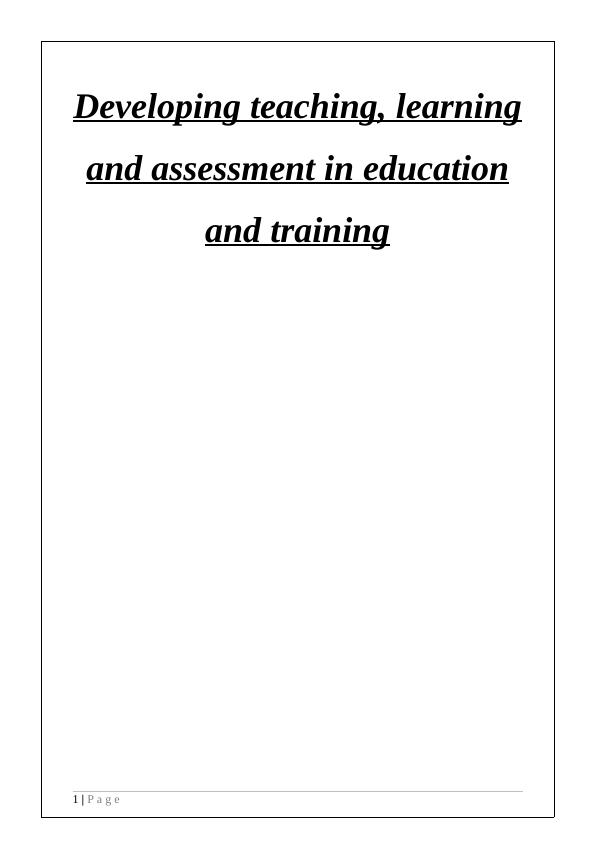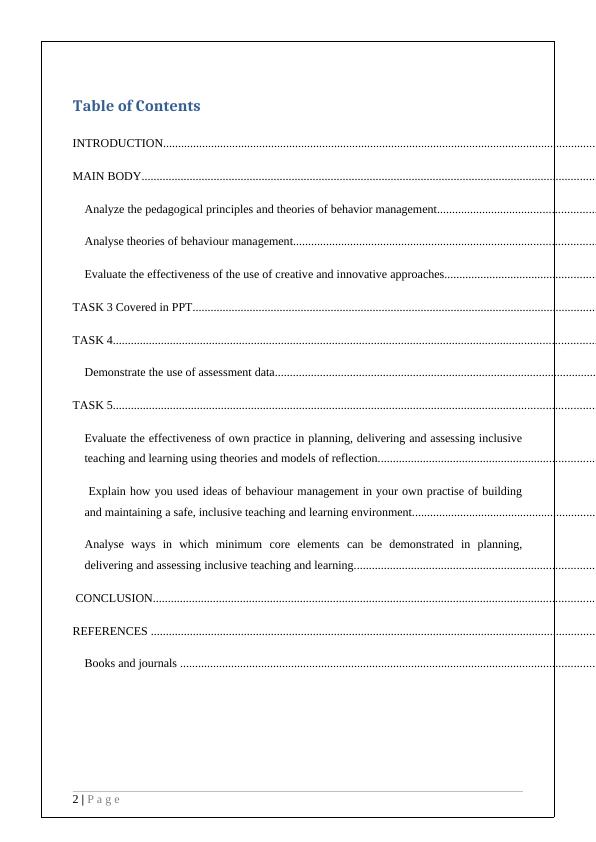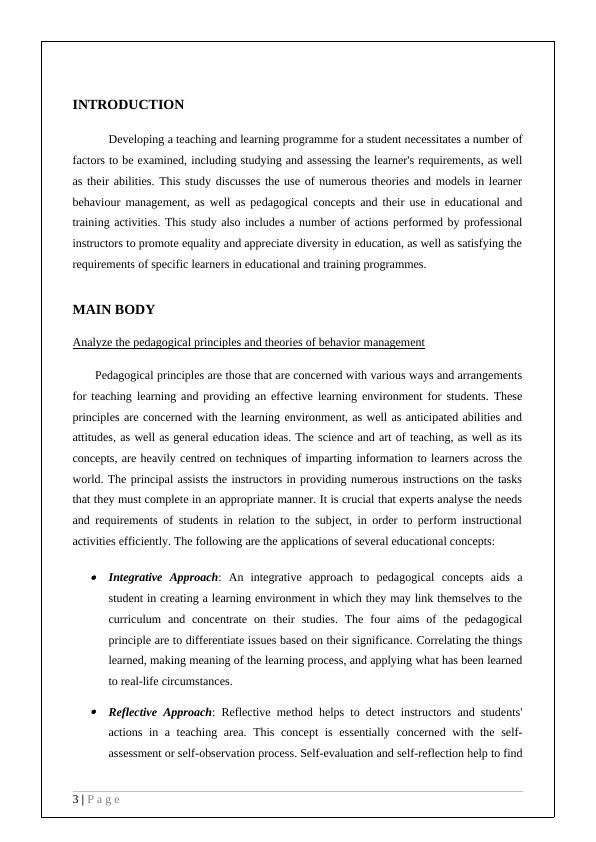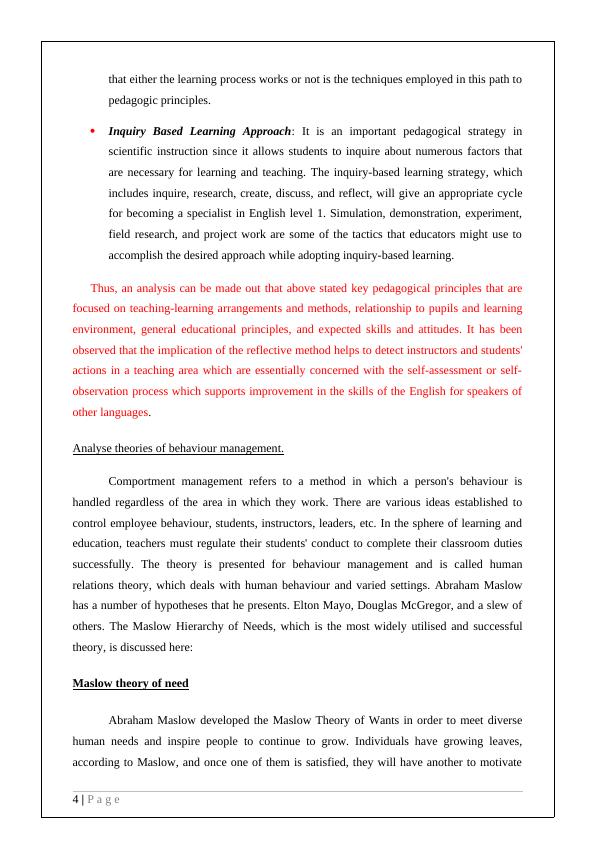Developing Teaching, Learning, and Assessment in Education and Training
Added on 2022-11-28
18 Pages5413 Words210 Views
Developing teaching, learning
and assessment in education
and training
1 | P a g e
and assessment in education
and training
1 | P a g e

Table of Contents
INTRODUCTION................................................................................................................................................
MAIN BODY........................................................................................................................................................
Analyze the pedagogical principles and theories of behavior management.....................................................
Analyse theories of behaviour management.....................................................................................................
Evaluate the effectiveness of the use of creative and innovative approaches...................................................
TASK 3 Covered in PPT.......................................................................................................................................
TASK 4.................................................................................................................................................................
Demonstrate the use of assessment data...........................................................................................................
TASK 5.................................................................................................................................................................
Evaluate the effectiveness of own practice in planning, delivering and assessing inclusive
teaching and learning using theories and models of reflection........................................................................
Explain how you used ideas of behaviour management in your own practise of building
and maintaining a safe, inclusive teaching and learning environment.............................................................
Analyse ways in which minimum core elements can be demonstrated in planning,
delivering and assessing inclusive teaching and learning................................................................................
CONCLUSION...................................................................................................................................................
REFERENCES ....................................................................................................................................................
Books and journals ..........................................................................................................................................
2 | P a g e
INTRODUCTION................................................................................................................................................
MAIN BODY........................................................................................................................................................
Analyze the pedagogical principles and theories of behavior management.....................................................
Analyse theories of behaviour management.....................................................................................................
Evaluate the effectiveness of the use of creative and innovative approaches...................................................
TASK 3 Covered in PPT.......................................................................................................................................
TASK 4.................................................................................................................................................................
Demonstrate the use of assessment data...........................................................................................................
TASK 5.................................................................................................................................................................
Evaluate the effectiveness of own practice in planning, delivering and assessing inclusive
teaching and learning using theories and models of reflection........................................................................
Explain how you used ideas of behaviour management in your own practise of building
and maintaining a safe, inclusive teaching and learning environment.............................................................
Analyse ways in which minimum core elements can be demonstrated in planning,
delivering and assessing inclusive teaching and learning................................................................................
CONCLUSION...................................................................................................................................................
REFERENCES ....................................................................................................................................................
Books and journals ..........................................................................................................................................
2 | P a g e

INTRODUCTION
Developing a teaching and learning programme for a student necessitates a number of
factors to be examined, including studying and assessing the learner's requirements, as well
as their abilities. This study discusses the use of numerous theories and models in learner
behaviour management, as well as pedagogical concepts and their use in educational and
training activities. This study also includes a number of actions performed by professional
instructors to promote equality and appreciate diversity in education, as well as satisfying the
requirements of specific learners in educational and training programmes.
MAIN BODY
Analyze the pedagogical principles and theories of behavior management
Pedagogical principles are those that are concerned with various ways and arrangements
for teaching learning and providing an effective learning environment for students. These
principles are concerned with the learning environment, as well as anticipated abilities and
attitudes, as well as general education ideas. The science and art of teaching, as well as its
concepts, are heavily centred on techniques of imparting information to learners across the
world. The principal assists the instructors in providing numerous instructions on the tasks
that they must complete in an appropriate manner. It is crucial that experts analyse the needs
and requirements of students in relation to the subject, in order to perform instructional
activities efficiently. The following are the applications of several educational concepts:
Integrative Approach: An integrative approach to pedagogical concepts aids a
student in creating a learning environment in which they may link themselves to the
curriculum and concentrate on their studies. The four aims of the pedagogical
principle are to differentiate issues based on their significance. Correlating the things
learned, making meaning of the learning process, and applying what has been learned
to real-life circumstances.
Reflective Approach: Reflective method helps to detect instructors and students'
actions in a teaching area. This concept is essentially concerned with the self-
assessment or self-observation process. Self-evaluation and self-reflection help to find
3 | P a g e
Developing a teaching and learning programme for a student necessitates a number of
factors to be examined, including studying and assessing the learner's requirements, as well
as their abilities. This study discusses the use of numerous theories and models in learner
behaviour management, as well as pedagogical concepts and their use in educational and
training activities. This study also includes a number of actions performed by professional
instructors to promote equality and appreciate diversity in education, as well as satisfying the
requirements of specific learners in educational and training programmes.
MAIN BODY
Analyze the pedagogical principles and theories of behavior management
Pedagogical principles are those that are concerned with various ways and arrangements
for teaching learning and providing an effective learning environment for students. These
principles are concerned with the learning environment, as well as anticipated abilities and
attitudes, as well as general education ideas. The science and art of teaching, as well as its
concepts, are heavily centred on techniques of imparting information to learners across the
world. The principal assists the instructors in providing numerous instructions on the tasks
that they must complete in an appropriate manner. It is crucial that experts analyse the needs
and requirements of students in relation to the subject, in order to perform instructional
activities efficiently. The following are the applications of several educational concepts:
Integrative Approach: An integrative approach to pedagogical concepts aids a
student in creating a learning environment in which they may link themselves to the
curriculum and concentrate on their studies. The four aims of the pedagogical
principle are to differentiate issues based on their significance. Correlating the things
learned, making meaning of the learning process, and applying what has been learned
to real-life circumstances.
Reflective Approach: Reflective method helps to detect instructors and students'
actions in a teaching area. This concept is essentially concerned with the self-
assessment or self-observation process. Self-evaluation and self-reflection help to find
3 | P a g e

that either the learning process works or not is the techniques employed in this path to
pedagogic principles.
Inquiry Based Learning Approach: It is an important pedagogical strategy in
scientific instruction since it allows students to inquire about numerous factors that
are necessary for learning and teaching. The inquiry-based learning strategy, which
includes inquire, research, create, discuss, and reflect, will give an appropriate cycle
for becoming a specialist in English level 1. Simulation, demonstration, experiment,
field research, and project work are some of the tactics that educators might use to
accomplish the desired approach while adopting inquiry-based learning.
Thus, an analysis can be made out that above stated key pedagogical principles that are
focused on teaching‐learning arrangements and methods, relationship to pupils and learning
environment, general educational principles, and expected skills and attitudes. It has been
observed that the implication of the reflective method helps to detect instructors and students'
actions in a teaching area which are essentially concerned with the self-assessment or self-
observation process which supports improvement in the skills of the English for speakers of
other languages.
Analyse theories of behaviour management.
Comportment management refers to a method in which a person's behaviour is
handled regardless of the area in which they work. There are various ideas established to
control employee behaviour, students, instructors, leaders, etc. In the sphere of learning and
education, teachers must regulate their students' conduct to complete their classroom duties
successfully. The theory is presented for behaviour management and is called human
relations theory, which deals with human behaviour and varied settings. Abraham Maslow
has a number of hypotheses that he presents. Elton Mayo, Douglas McGregor, and a slew of
others. The Maslow Hierarchy of Needs, which is the most widely utilised and successful
theory, is discussed here:
Maslow theory of need
Abraham Maslow developed the Maslow Theory of Wants in order to meet diverse
human needs and inspire people to continue to grow. Individuals have growing leaves,
according to Maslow, and once one of them is satisfied, they will have another to motivate
4 | P a g e
pedagogic principles.
Inquiry Based Learning Approach: It is an important pedagogical strategy in
scientific instruction since it allows students to inquire about numerous factors that
are necessary for learning and teaching. The inquiry-based learning strategy, which
includes inquire, research, create, discuss, and reflect, will give an appropriate cycle
for becoming a specialist in English level 1. Simulation, demonstration, experiment,
field research, and project work are some of the tactics that educators might use to
accomplish the desired approach while adopting inquiry-based learning.
Thus, an analysis can be made out that above stated key pedagogical principles that are
focused on teaching‐learning arrangements and methods, relationship to pupils and learning
environment, general educational principles, and expected skills and attitudes. It has been
observed that the implication of the reflective method helps to detect instructors and students'
actions in a teaching area which are essentially concerned with the self-assessment or self-
observation process which supports improvement in the skills of the English for speakers of
other languages.
Analyse theories of behaviour management.
Comportment management refers to a method in which a person's behaviour is
handled regardless of the area in which they work. There are various ideas established to
control employee behaviour, students, instructors, leaders, etc. In the sphere of learning and
education, teachers must regulate their students' conduct to complete their classroom duties
successfully. The theory is presented for behaviour management and is called human
relations theory, which deals with human behaviour and varied settings. Abraham Maslow
has a number of hypotheses that he presents. Elton Mayo, Douglas McGregor, and a slew of
others. The Maslow Hierarchy of Needs, which is the most widely utilised and successful
theory, is discussed here:
Maslow theory of need
Abraham Maslow developed the Maslow Theory of Wants in order to meet diverse
human needs and inspire people to continue to grow. Individuals have growing leaves,
according to Maslow, and once one of them is satisfied, they will have another to motivate
4 | P a g e

End of preview
Want to access all the pages? Upload your documents or become a member.
Related Documents
Developing Teaching, Learning, and Assessment in Education and Traininglg...
|14
|3902
|315
Developing Teaching, Learning and Assessment in Education and Traininglg...
|18
|5571
|2
Developing Teaching, Learning, and Assessment in Education and Traininglg...
|16
|4392
|451
Developing Inclusive Teaching and Learning Practices in Education and Traininglg...
|15
|4859
|290
Principles, Theories and Models of Learning and Educationlg...
|19
|4044
|139
Teaching, Learning and Assessment in Education & Traininglg...
|17
|4967
|215
